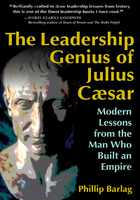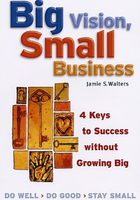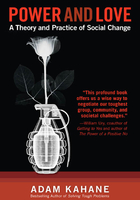The team was excited about its first visit. Everyone knew the reputation of the Special Forces as an elite unit of dedicated professional service members who get results. As Debbie prepared for the visit, she couldn't help but wonder if the general would share the same principles that she believed were essential to creating high performance in a team.
The team had decided to split the assignments, and they agreed to let Jo stay home with her mom. On this trip, Debbie would be joined by Tom and Javier.
As they approached the general's home, Debbie wasn't sure what to expect. However, she did have in her mind what she thought the general would look like—a classic Army general, the type you'd see in the movies. Her stereotype was about to be challenged.
When Debbie and her team arrived at the address they had been given, they were greeted by a man that she assumed was the general, but he didn't look at all like what she had imagined. She knew he was retired, but she hadn't expected him to be so old. He was short, too; for some reason, she had thought he would be taller.
“Hello, General Grant,” she said with a bit of a question in her voice. “My name is Debbie.”
He stopped her, “Dear, please call me Roger. I was a general once, but I'll always be Roger.” He smiled.
Debbie had expected the tone of a drill sergeant barking orders, not the warmth she encountered. He spoke softly. “Please, come in.”
“Yes, sir. Thank you. This is Tom and Javier. We really appreciate you sharing your time and your experience with us.”
“It's my pleasure. I love to serve whenever I can,” he added.
Debbie thought, That makes sense. He and Jeff are friends. Jeff believes that the best leaders serve. And here we are meeting the general, and in the first two minutes, he's talking about serving. I don't think that's a coincidence. One of them has clearly influenced the other.
Roger continued, “How's Jeff?”
“He's doing really well. Our business is under some intense pressure right now, but I'm confident in his leadership,” Debbie said.
“I share your confidence. Nothing clarifies your thinking like an imminent threat. My money is on Jeff and your team meeting all the challenges you face. May I offer you something to drink?”
The group declined his offer.
“That's fine. I'm going to have tea. Have a seat here in the living room, and I'll get the tea and some extra cups. You may change your mind.”
When Roger returned from the kitchen, he sat down and immediately asked, “Specifically, how may I help you?”
“We think we can best meet the challenges we face in our organization by helping our leaders build stronger teams,” Tom said.
“I agree completely,” Roger said.
“So, we want to talk to you about what makes the Special Forces units such strong teams,” Javier said.
“How much time do you have?” Roger chuckled. “That's how I invested most of my time as a leader for over thirty years.”
“Well, it sounds like we've come to see the right person,” Debbie observed. “Can you share some of what you've learned from your experience?”
“Certainly!” Roger seemed energized by the opportunity.
As he began to talk, it was clear that he had given this topic a lot of thought.
“I have discovered that there are three pillars that support the success of a team,” he began. “The first you can call selection.
“It matters who is on the team. We were very diligent in our selection process. We had very high standards that were clearly articulated and rigorously enforced. We didn't accept just anyone on our team. We wanted people who had the attitude and the aptitude for the job. This is intended to be an elite group. I don't mean elite as in arrogant. I do mean that it was and still is a select group. Is that clear?”
Tom asked, “What happened when you got the wrong person on the team?”
“When we made a mistake in the selection process, we would move quickly to take corrective action.”
“How did you handle that?” Javier wasn't sure he really wanted to know what corrective action meant in the military, but he asked anyway.
Roger responded, “Depending on the issue, reassignment or discharge were our options.”
The group continued to talk about selection for almost an hour. They probed the criteria to be part of Special Forces, the selection process, and more. Several of Roger's thoughts were accompanied by very interesting stories.
Then, without much of a transition, Roger said, “The second pillar is training.
“We were a training machine. A team can't really be a team if its members don't know what they're doing. And we found that repetition was our friend. Continuous training helped keep the team sharp.”
Debbie had a question: “Roger, what kind of training?”
Roger responded, “All types. Job- and role-specific, hard and soft skills, combat and survival, the skills of leadership and management, team skills, problem solving, decision making … and the list goes on and on.”
“I don't think about many of those things when I think about Special Forces,” admitted Javier.
“Nor should you,” said Roger. “However, those things are the reason you have such a high opinion of the Special Forces. You're not supposed to see the process, just the outcome. Training is a key driver for superior performance that is replicable over time—and in ever-changing situations. Training is the mother of consistency. Without extreme levels of training, you can't predict the outcome with any level of certainty. And when the Special Forces are involved, we want to do everything we can to bring about a positive outcome. Most often, lives are at stake.”
Roger stopped and sipped his tea. “Questions?”
“Was there resistance to so much training?” Javier asked.
“Certainly, but it was one of the nonnegotiables. Our soldiers clearly understood why we were training. Staying alive is usually sufficient motivation. However, there's nothing that really makes you want to jump out of a helicopter into the North Sea in a training exercise. It's really cold.” Roger grinned in such a way that the three visitors all had the same thought: He probably loved it!
“Any other questions about training?” Roger asked.
The team had a few other questions about the specific team-related skills he taught his soldiers. Once again, he was gracious and answered every question.
Javier, wanting to be sure they had ample time for the next topic, said, “Roger, you mentioned a third pillar?”
“Yes, I call it esprit de corps.”
“Is that Latin?” Tom asked.
“It's French.”
“What exactly does it mean?” Debbie only had a vague idea.
Roger said, “It means ‘group spirit.’ Or to put it another way, ‘a strong sense of enthusiasm and dedication that unites a group.’”
“Tell us why that's the third pillar,” Javier said.
“That's what makes all the difference. It's really the ‘secret sauce.’ Many teams that are good never become great because of this missing ingredient. Some leaders see it as too soft or too vague or too elusive. It may be all three, but it is extremely powerful. When it exists, men and women will sacrifice their lives for their comrades. They'll endure extreme hardship for the sake of others on the team. They'll work harder and longer because of this element. This is not the head stuff that you can drill in through training. This is the heart stuff. It's where great achievement ultimately comes from. That's why I said earlier that training was one of the drivers of superior performance. Training is critical, but it's for the head. Esprit de corps is about the heart. Particularly when things get really hard, it becomes an even bigger part of achieving high performance.”
Debbie felt that very few people had seen this level of commitment before. “How do you create it?”
“It takes some time,” Roger said, “and you have to be deliberate. However, don't miss the point.”
“And that is ….” Tom was quite sure he'd already missed it.
“The point is, your team will never perform at the highest possible level if the members of the team don't exhibit genuine care and concern for one another. The best leaders create an environment where this is the norm. And once it is achieved, they work diligently to maintain that culture.
“In summary, to create extraordinary team performance, the leader must focus on the three pillars of selection, training, and esprit de corps. Any questions?”
“I've got a question that feels related to me,” Javier said. “With all this talk about teams, how does that impact decision making?”
“There's a misconception about the military in general. It revolves around command and control. While there is always a place for this type of decision making—and perhaps more often in the military—it is not the path to high performance over the long haul. I knew I had a critical role to play in the success of the Special Forces, and every leader in our organization knew that, too. However, we had to create teams that could work without us—small teams that could make decisions in a hurry, often with limited information, and most likely, the difficulty was compounded by the urgency of the situation.
“In a true command-and-control scenario, the leader would make all the decisions. That's certainly not feasible, nor would it be desirable. The more decisions a leader makes, the further he or she is from leading a high-performing team. Leaders who make too many command decisions don't get more responsibility. Over time, they get less. Make too many command decisions, and you'll doom yourself and your team to mediocrity.”
“Wow! I never thought about it like that,” Javier admitted.
“Anything else you'd like to talk about?” Roger asked.
Debbie and the team asked a few follow-up questions and then thanked Roger for his time.
“It's been my pleasure,” he said warmly. “I don't get to talk about these things much anymore. Thanks for coming. Please tell Jeff I said hello!”
“I will!” Debbie replied.















